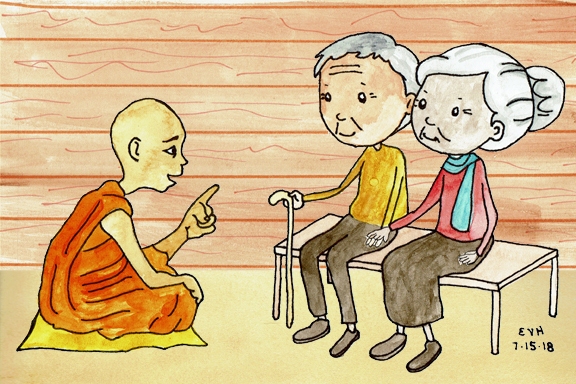
Jataka 68
Sākata Jātaka
The City of Sākata Story
as told by Eric Van Horn
originally translated by Robert Chalmers, B.A., of Oriel College, Oxford University
originally edited by Professor Edward Byles Cowell, Cambridge University
This is somewhat curious yet tender story about the Buddha and an old couple. The Buddha spoke often about the importance of respecting and revering your parents. Now of course, there are cases where parents treat their children badly. But sadly, there are probably just as many cases where adult children abuse their aging parents. Perhaps our culture could do with a little more of the kind of parent-child respect demonstrated in the story. The tender way in which the Buddha treats the apparently delusional old couple is quite touching.
There is also a lesson in here about our instincts. We are sometimes inexplicably drawn to certain people. We have an instant connection and ease with some people. It does not happen often, but it does happen. I think the story is suggesting that we trust those instincts. They may be karmic bonds from previous lives, and such bonds should be honored.
The final touch in this story is that after hearing the Buddha teach, the elderly couple attains the second stage of awakening as once-returners. His debt to them is complete.
“The man on whom you rest your mind.” This story was told by the Master while he was at Añjanavana. It is about a certain brahmin. Tradition says that when the Blessed One entered the city of Sāketa with his disciples, an old brahmin of that place, who was going out, met him at the gate. Falling at the Buddha’s feet and clasping him by the ankles, the old man cried, “Son, is it not the duty of children to cherish the old age of their parents? Why have you not let us see you all this long time? At last I have seen you. Come, let your mother see you too.”
So saying, he took the Master with him to his house. There the Master sat on the seat prepared for him with his disciples seated around him. Then the brahmin’s wife came, and she too fell at the feet of the Blessed One, crying, “My son, where have you been all this time? Is it not the duty of children to comfort their parents in their old age?” Then she called to her sons and daughters that their brother had come, and they saluted the Buddha as well. In their joy the aged couple showed great hospitality to their guests. After his meal, the Master recited the “Sutta on Old Age” (The Jāra Sutta, which is discourse 4.6 in the Sutta Nipāta) to the old people. When he finished, both the husband and the wife won the fruition of the Second Path (once-returner). Then rising up from his seat, the Master went back to Añjanavana.

Figure: The Buddha Teaches the Elderly Couple
Meeting together in the Dharma Hall, the monks fell to talking about this event. It was urged that the brahmin must have been well aware that Suddhodana was the father and Mahāmāyā the mother of the Buddha. Yet none-the-less, he and his wife had claimed the Buddha as their own son, and they did so with the Master’s consent. What could it all mean? Hearing their talk, the Master said, “Monks, the aged pair were right in claiming me as their son.” And so saying, he told this story of the past.
Brothers, in ages past this brahmin was my father in 500 successive births. He was my uncle for the same number of rebirths, and in 500 more he was my grandfather. And in 1500 successive births his wife was respectively my mother, my aunt, and my grandmother. So I was brought up in 1500 births by this brahmin and in 1500 by his wife.
Having told of these 3000 births, the Master, as Buddha, recited this stanza:
The man on whom your mind rests, with whom your heart
Is pleased at first sight, place your trust in him.
His lesson ended, the Master showed the connection and identified the birth by saying, “This brahmin and his wife were the husband and wife in all those existences, and I was the child.”
